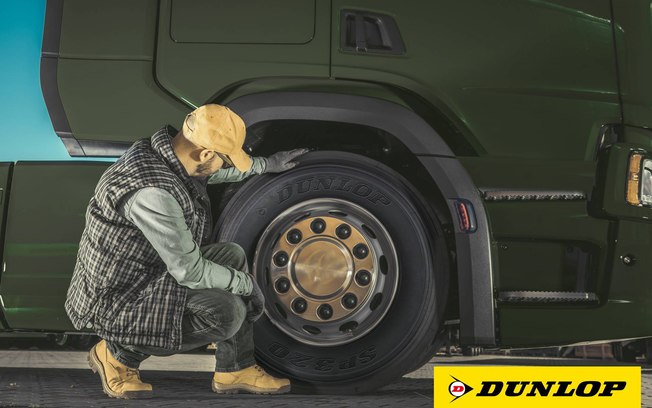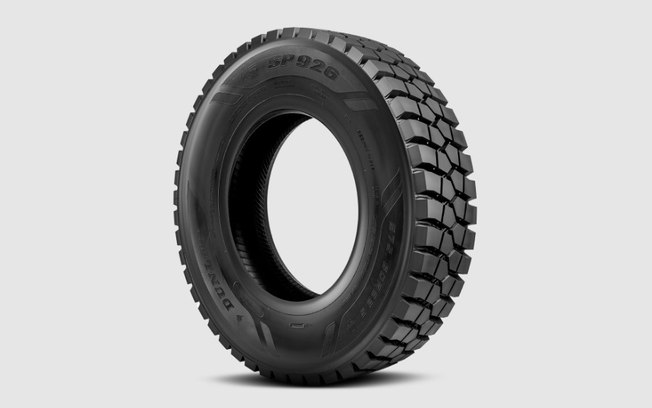Dunlop has announced the arrival of the SP926, its new tire for the heavy vehicle line. According to the brand, the new tire was developed for the Brazilian market and tested in situations of severe use, such as in the transport of sugar cane, and presented the best cost per kilometer compared to rivals.
The tire was tested in sugar cane and alcohol plants such as Batatais (SP) and Dacalda (Jacarezinho-PR), and showed superior performance to rivals, according to documents shared with journalists. According to Dunlop, the SP926 can be used on mixer trucks, canavieiros, garbage collection, and terraplaning.
During the testing period, approximately 5,368 units were delivered to the plants and equipped 159 trucks, running between 4 and 10,000 km/month, depending on the difficulty of the plant’s terrain.
As a tire intended only for traction, the SP926 has measurements of 295/80R22.5, a load index of 152, a diameter of 1069 mm, a section width of 304 mm, a tread depth of 26.1 mm, and four layers of steel in its structure, which guarantees a high retreading index.
The SP926 has been three years in development and features greater durability, 31% deeper grooves than its predecessor, a design that allows for self-cleaning and a reinforced lug with a double layer of nylon. In addition, the manufacturer claims that the differential of its tire is the Sun System construction, which allows the tires to be produced without seams in the rubber parts.
The SP926 is part of a segment of mixed-use tires, i.e. they can run off-road in difficult terrain, and for this reason, it has a differentiated compound, providing more resistance to cutting and chipping.
Tires for this type of use represent 19% of the market segmentation for heavy line tires in the country, second only to road tires, which represent 67% of the market.
Documents prove the tests
According to documents shared by the manufacturer, reports from the plants where the tires were tested show that the SP926 was able to run a longer mileage with the original tread. In one of the tests, at the Olho D’água plant in Camutanga (PE), an average of 70,325 km were run with the original tire tread, beating the rival manufactured by Goodyear by 13,000 km. In addition, the Dunlop had 9.3 mm of remaining tread depth, while its rival had no more than 7 mm.
Growth Pace

According to Dunlop, the brand’s operations in both the passenger car and heavy vehicle segments will grow over the next few years. The manufacturer has not yet closed the investment cycle of 2.46 billion reais, with 1 billion reais still to be paid in. The forecast is that this amount will be invested by 2025, with studies of new investments starting in 2026.
Currently, the production capacity of the Fazenda Rio Grande (PR) plant is 20,000 tires/day, with heavy-duty models accounting for around 1,500 units per day. The expectation is that by 2029 this figure will be doubled, and that the plant’s total production will reach 30,000 units by 2025.

These new investments made by Dunlop are part of a plan to increase the brand’s share of the Brazilian market. Currently, the brand equips FiatMobi, Argo, Strada and Pulse Abarth, Honda City hatch and sedan, Toyota Yaris(Hatch and sedan), Corolla Cross, Corolla sedan Altis and Hybrid, Hilux single cab, double cab and SW4, as well as Volkswagen Polo and Virtus.
Among commercial vehicles, Dunlop already equips the Volkswagen Constellation in various sizes, the Iveco Daily and Tector, as well as the Volare Marcopolo.
Dunlop’s plans are to increase production capacity and equip new products in the passenger and commercial/heavy-duty lines. To the journalists present at the factory, Dunlop confirmed that it will equip, for example, Toyota’s next SUV, the Yaris Cross.


